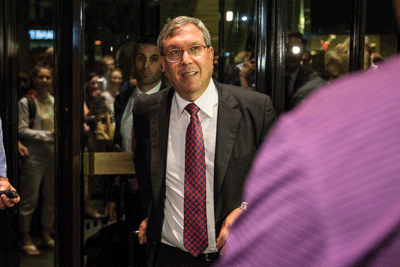Antitrust lawsuits may be the fastest path to determine whether college athletes will get more rights and compensation, lawyers say, and the leader of the student unionization movement agrees with them.
“The antitrust route is the most immediate way for players to receive more resources and benefits and directly strike down NCAA rules,” said Ramogi Huma, president of the College Athletes Players Association, a labor organization that was working with Northwestern football team members trying to unionize.
The National Labor Relations Board, in a unanimous decision last week, voted not to assert jurisdiction over the union petition filed by the association on behalf of the Northwestern football team.
Huma said the effort to unionize college athletes was not dead but had been certainly been delayed, noting that it took 18 months from the petition’s filing until the NLRB announced its decision not to make a decision.
Meanwhile, several lawsuits seeking to strike down NCAA limits on player compensation are underway.
 |
Please enter image description here.
Photo by: Enter Name Here |
Jeffrey Kessler, an antitrust attorney who serves as outside counsel to players unions, including the NFL Players Association, is the lead counsel in one such lawsuit, Jenkins v. the NCAA. He noted that there have been two schools of thought about how to achieve more rights and compensation for student athletes: unionization or antitrust.
“I think now that the NLRB has acted, it is very clear that antitrust is the right way for the players to go,” Kessler said. Jenkins v. the NCAA is set for a hearing Oct. 1 in Oakland to determine whether the case will get class certification to represent all Division I college football and men’s basketball players.
If Kessler were to win that case, “the rules that the NCAA has preventing the athletes from being compensated will be struck down and the schools and the conferences will be able to determine how best to compete with each other,” he said.
The NLRB, in choosing not to decide the merits of the Northwestern case, cited the fact that it does not have jurisdiction over public school employees. Northwestern is private, one of just 17 private schools among the 125 NCAA Division I schools.
Both Kessler and Sathya Gosselin, a partner in the law firm Hausfeld, which tried the O’Bannon v. NCAA antitrust case, noted that antitrust litigation would provide a solution for student athletes at all Division I universities.
“The NRLB’s decision underscores the need for a solution for all student athletes and not just some,” Gosselin said. “Our trial decision in O’Bannon and the resulting permanent injunction does just that, in a way that compels no particular action but invites competition through revenue sharing with college athletes.”
The O’Bannon antitrust case is before the 9th U.S. Circuit Court of Appeals after U.S. District Judge Claudia Wilken, who is also hearing the Jenkins case, found that NCAA rules limiting student-athlete compensation were a restraint of trade. Wilken issued an injunction in O’Bannon that would have allowed schools to begin offering men’s basketball and football players $5,000 in deferred compensation.
The appeals court stayed the injunction in a ruling July 31 without ruling on the merits of the case.
The NCAA would not comment for this story. Jeffrey Mishkin, a partner at Skadden Arps Meagher & Flom, who represents the NCAA in the Jenkins case, did not return a phone call.
Gregg Clifton, co-leader of the Jackson Lewis law firm’s collegiate and professional sports group practice, who advises schools and conferences, said that the antitrust litigation could have both a more immediate and a further reaching effect when it is decided than the NRLB’s ruling last week.
“The unionization issue was certainly of interest to all the universities, but at this point it was only going to impact one directly, Northwestern,” Clifton said. “Certainly any type of antitrust litigation has the potential to impact a broader range of universities.”
Clifton said that the NLRB decision essentially created “a roadblock” to college players unionizing, as players would have to come up with a very different set of facts than exist at Northwestern to go before the NLRB again.
Huma wouldn’t comment on what future unionization efforts his association was considering. “We are not going to signal anything specific about our next steps,” he said. “It is not going to help us.”
Gary Roberts, who teaches sports law at Indiana University and formerly worked for Covington & Burling, the NFL’s outside law firm, said the antitrust litigation has always been the real threat to the status quo of college sports.
“That’s where all eyes should have been focused in the first place,” Roberts said. “The labor thing was a sideshow and it was an interesting sideshow. And it got a lot of attention because it was the first time anyone had ever tried that, but it was never a real, serious threat.”




